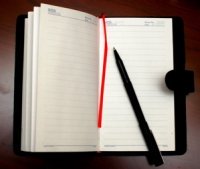|
|
The Wine Tasting Journal
 When wine tasting, a wine tasting journal can be a important tool. Why? As I've said elsewhere, taking wine tasting notes is important for many reasons when trying to critically evaluate a wine and learn more about the wines you taste. For one thing, the simple act of writing down your thoughts about a wine, its aromas and flavors and your general impressions, forces you to analyze the nuances of each wine and put those thoughts into words. This practice can be very useful and focuses your analysis. Rather than just getting a general instinctual feeling for a wine, it allows you to delve deeper into its depths and really appreciate, or criticize, the wines components, its highlights and weak points. When wine tasting, a wine tasting journal can be a important tool. Why? As I've said elsewhere, taking wine tasting notes is important for many reasons when trying to critically evaluate a wine and learn more about the wines you taste. For one thing, the simple act of writing down your thoughts about a wine, its aromas and flavors and your general impressions, forces you to analyze the nuances of each wine and put those thoughts into words. This practice can be very useful and focuses your analysis. Rather than just getting a general instinctual feeling for a wine, it allows you to delve deeper into its depths and really appreciate, or criticize, the wines components, its highlights and weak points.
Writing down your tasting notes also helps you to remember the wines you have tasted. The act of writing down the wine's name and vintage helps you remember the name and producer of the wine and you have a resource to go back to and consult in the future. I find that the wines I take detailed notes on stick out in my mind, good or bad, much more than those that were tasted in passing without any notation. So why is a wine tasting journal important? Why can't you just take your notes on scrap paper or a paper napkin? Well there are several reasons I can think of: - A wine tasting journal organizes all your tasting notes into a consistent, cohesive and consecutive log of all the wines you taste. In other words, you know where to go to find a wine. You can flip through chronologically and find a wine you have tasted much easier than digging through piles of separate sheets of paper strewn around your house!
- A wine journal helps to focus your note taking, organizing your notes into important aspects of a wine including wine color and appearance, wine aroma (the "nose") and wine flavor (the "mouth"). This helps guide your critical analysis of each wine and keep them consistent, without missing anything.
- Less importantly but not to be discredited, carrying a wine tasting journal with you makes you look serious about your wine hobby. This may seem silly, but in fact this helps stir up conversation with like-minded eonophiles (wine lovers). In a restaurant, wine tasting or other event, pulling out your wine journal shows that you mean business and are passionate about your wine tasting.
- As you gain more experience and taste dozens, then hundreds, then thousands of wines, you will have a convenient personal wine history which you can show off and refer back to. I often go back and relive tastings by reading my old notes of great wines or simply consult my old notes to see if I liked a particular wine or not if I cannot remember my original impressions.
What types of wine tasting journals are there?- Wine Tasting Notes Template Journals - There are many sources that make various types of wine tasting journals which have wine tasting templates already printed on each page. These vary in size as well as the type of template each page contains but generally they have spaces for the date, wine producer and name, vintage, bottle size as well as room for notes on each aspect of a wine, its color, aroma and flavors. Some also have grading scales to help you assess each wine so that you can give an indication of how much you liked it. Depending on how your mind works, this organized and formated wine tasting note may help you focus your tasting and analysis so that you are thorough and complete with each wine. Many beginning wine enthusiasts start with a journal such as this. Some eventually find that they later prefer switching to a blank journal while others like the format and stick with it.
If you want some downloadable wine journal template forms in PDF format, we have made a few available on our Wine Tasting Notes Template page. These can help give you a wine journal template to work with until you find a suitable journal. Enjoy! - Blank Journal/Notebook - This is simply any journal or notebook into which you can transcribe your impressions, either in an unformatted note or by breaking it down into your own sections (such as wine name, color, nose, mouth, score, etc., for example). Once you have more experience with evaluating wines you may find this format less restrictive and you can taylor it to what feels best and most helpful to you. Any blank journal, diary or notebook will do. Some people prefer simple inexpensive notepads while others like to have attractive bound journal books.
Early on in my experience with wine, I found a particular brand of blank journal with various artwork on the cover and a nice elastic band that holds it shut. I liked it so much that I bought several to use as my wine tasting journal and have over the years filled up many of them with my wine tasting notes as well as notes about various wine and food events at restaurants. Find whatever feels most comfortable and aesthetically pleasing to you!
Good luck finding a good wine journal. After that, all you need to do is start drinking some wine, which is the fun part!
Done with the Wine Tasting Journal page?
Return to the How to Taste Wine page.

|
|
|




 When wine tasting, a wine tasting journal can be a important tool. Why? As I've said elsewhere, taking wine tasting notes is important for many reasons when trying to critically evaluate a wine and learn more about the wines you taste. For one thing, the simple act of writing down your thoughts about a wine, its aromas and flavors and your general impressions, forces you to analyze the nuances of each wine and put those thoughts into words. This practice can be very useful and focuses your analysis. Rather than just getting a general instinctual feeling for a wine, it allows you to delve deeper into its depths and really appreciate, or criticize, the wines components, its highlights and weak points.
When wine tasting, a wine tasting journal can be a important tool. Why? As I've said elsewhere, taking wine tasting notes is important for many reasons when trying to critically evaluate a wine and learn more about the wines you taste. For one thing, the simple act of writing down your thoughts about a wine, its aromas and flavors and your general impressions, forces you to analyze the nuances of each wine and put those thoughts into words. This practice can be very useful and focuses your analysis. Rather than just getting a general instinctual feeling for a wine, it allows you to delve deeper into its depths and really appreciate, or criticize, the wines components, its highlights and weak points.


